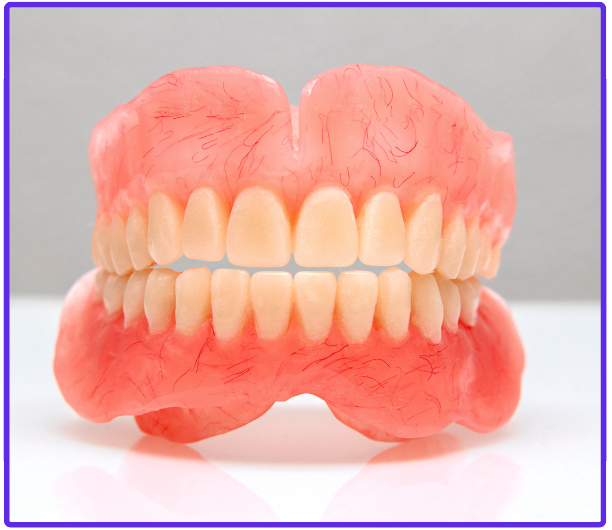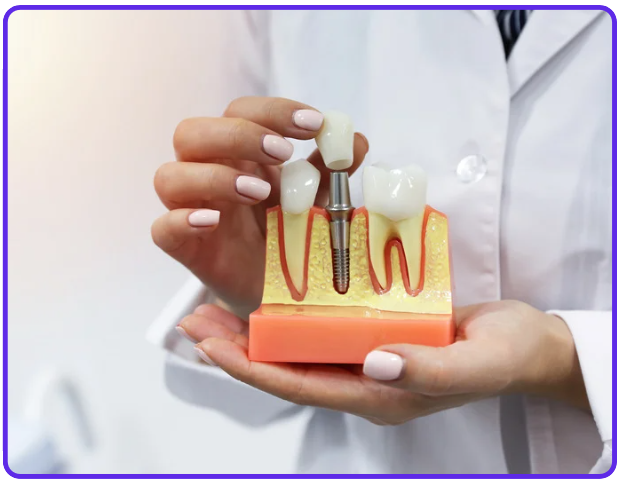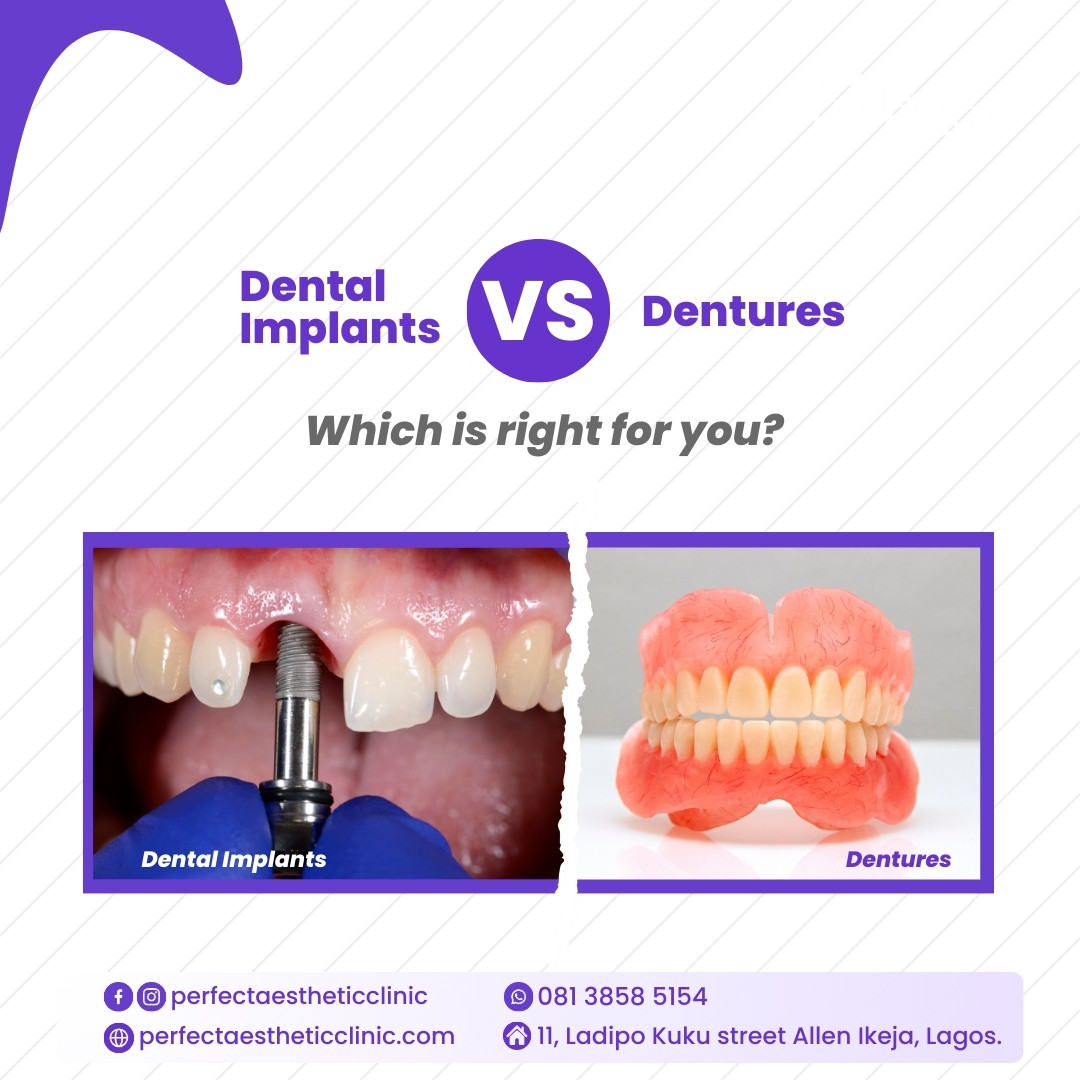Missing teeth can be a significant concern, impacting your smile’s aesthetics and your ability to eat, speak, and chew comfortably. Fortunately, dental clinics offer two excellent solutions for replacing missing teeth: dental implants and dentures.

While dentures and implants can restore your tooth, they differ significantly in function, feel, and longevity.
This post delves into the key differences between dental implants and dentures, helping you understand which option might be the best for you.
Ultimately, the ideal choice depends on your circumstances, budget, and desired outcome. However, we’ll explore the advantages of dental implants, making a strong case for implants as a superior solution for a lasting, natural-looking smile.
What are dentures?
Dentures are removable replacements for missing teeth, crafted from acrylic resin or a combination of acrylic and metal.

They come in two primary forms:
1. Full dentures replace all teeth in either the upper or lower jaw, or both.
2. Partial dentures: These are used when some natural teeth remain. They fill in the gaps created by missing teeth, attaching to the remaining natural teeth with clasps or metal frameworks.
Some benefits of dentures include:
1. Cost-effective: Dentures are generally a more affordable option upfront compared to dental implants.
2. Quick procedure: Getting fitted for dentures is typically faster than dental implants.
3. Suitable for some jawbone conditions: Dentures can be a good option for individuals with compromised jawbone health.
Challenges associated with dentures are:
1. Dentures can slip or become loose, especially over time, causing discomfort and slurred speech during eating or speaking.
2. Dentures don’t stimulate the jawbone like natural teeth, leading to bone loss over time, further impacting denture fit.
3. Dentures require regular cleaning and soaking in solutions to prevent bacterial growth and maintain hygiene.
4. Dentures may not allow you to bite or chew with the same force as natural teeth, potentially limiting your dietary choices.
Why are dental implants a more permanent solution?
Dental implants are considered the gold standard for tooth replacement, offering a more natural look, feel, and function than dentures.

Implants are small titanium posts surgically placed into the jawbone, acting as anchors for artificial teeth. These teeth, called crowns, are custom-designed to match your surrounding teeth in size, shape, and colour.
Some benefits of dental implants for your teeth replacement include:
1. Dental implants fuse with the jawbone, mimicking the function of natural teeth. This provides a stable, secure fit and allows for natural biting and chewing.
2. With proper care, dental implants can last a lifetime, eliminating the need for replacements frequently required with dentures.
3. Implants stimulate the jawbone, preventing bone loss and promoting long-term oral health.
4. A secure, natural-looking tooth can significantly boost your confidence and self-esteem.
5. Dental implants allow you to enjoy a wider range of foods without worrying about limitations often associated with dentures.
What you should know before considering dental implants.
1. Cost: Dental implants are typically a more significant upfront investment than dentures.
However, considering their longevity and reduced need for replacements, they are a cost-effective option in the long run.
2. Procedure: Dental implant placement is a surgical procedure requiring a longer treatment time than dentures.
Modern dental techniques and anesthesia ensure a comfortable experience.
3. Eligibility: Dental implant placement requires sufficient healthy jawbone density to support the implants.
In some cases, bone grafting procedures might be necessary before implant placement.
Expert dentist opinion and consideration:
Ultimately, the best choice between dentures and dental implants depends on your needs, budget, and oral health.
A qualified dentist should assess your teeth, discuss your goals for tooth replacement, and recommend the best option for you.
They should address any concerns you have about dental implant surgery and aftercare.
The advantages of dental implants for your tooth.
While dentures and implants can restore your smile, dental implants offer several advantages that make them a better choice for many people.
Here’s a recap of the key benefits:
• Dental implants provide a secure, comfortable fit that eliminates the worry of slipping or clicking commonly associated with dentures.
• Implants function similarly to natural teeth, allowing you to enjoy a wider variety of foods without limitations.
• Implants stimulate the jawbone, preventing bone loss and maintaining long-term oral health.
• Dentures can sometimes affect speech due to slipping or loose fit. Implants provide a stable base for speaking clearly and confidently.
• Implants look and feel natural, seamlessly integrating with your surrounding teeth for a beautiful smile.
• With proper care, dental implants can last a lifetime, eliminating the need for replacements frequently required with dentures.
• A secure and natural-looking smile can significantly boost your confidence and self-esteem in social and professional settings.
If you are considering dental implants, there are some lifestyle changes you might want to make:
1. Good overall health is essential for surgery, including dental implants.
2. Smoking can impede healing and increase the risk of implant failure.
Pro tip: Quit smoking before and after surgery. [highly recommended.]
3. Maintaining good oral hygiene is crucial for the long-term success of dental implants.
Brushing, flossing, and regular dental checkups are essential.
Why dental implants are worth it.
While the initial cost of dental implants might seem higher than dentures, their numerous advantages make them a worthwhile investment.
Implants offer a long-lasting solution that promotes oral health, improves function, and enhances your smile’s aesthetics and confidence.
Here’s a final point to consider:
Cost vs. value: Dentures are a budget-friendly option upfront. However, consider the ongoing costs of replacements and potential adjustments over time.
While initially more expensive, dental implants offer a long-term solution with minimal future costs.
Lastly, you need a qualified dentist to replace missing teeth with dental implants.
They can assess your individual needs, discuss treatment options, and answer any questions you might have.
With dental implants, you can invest in healthy, beautiful teeth that feel natural and lasts a lifetime.
Schedule an appointment with us today to discuss your individual needs and explore the best dental procedures for a healthy, confident smile!

Leave a Reply